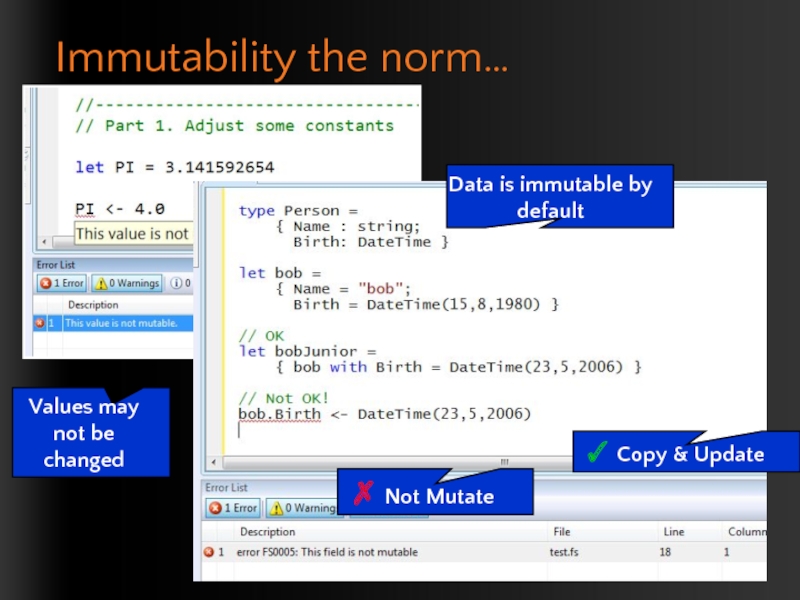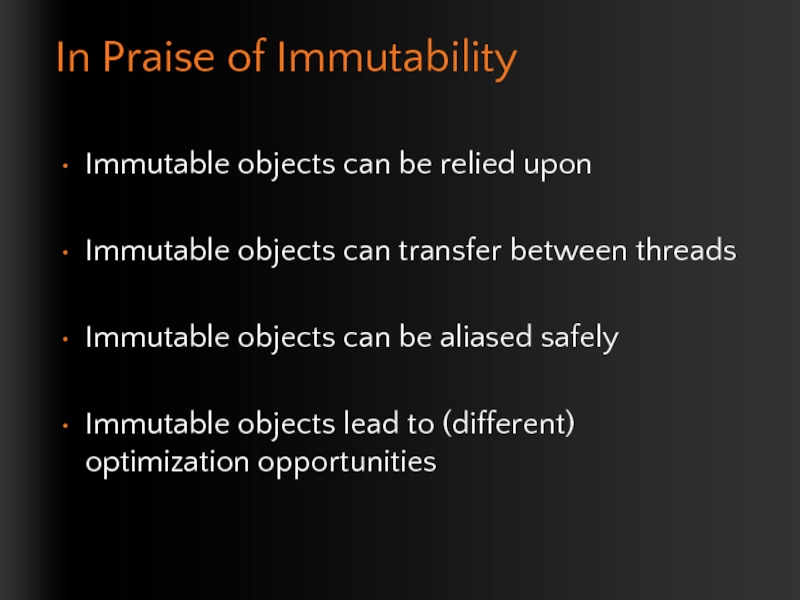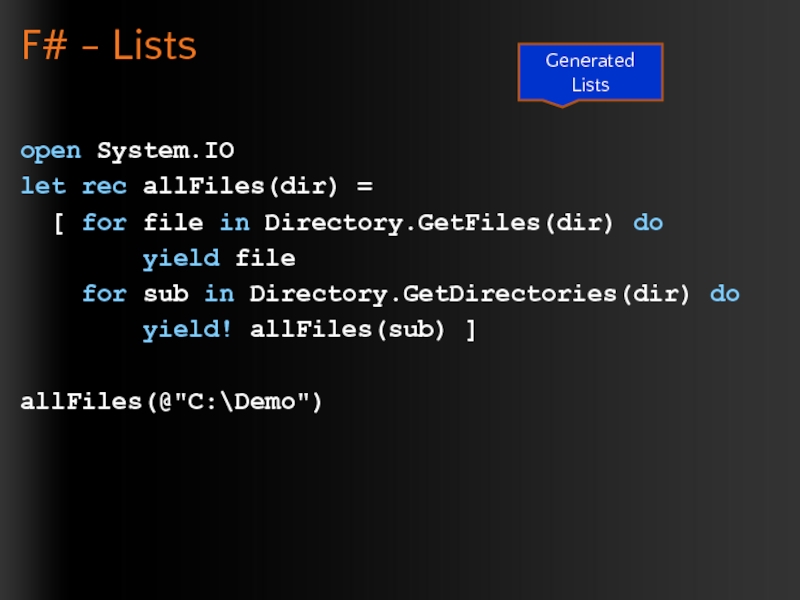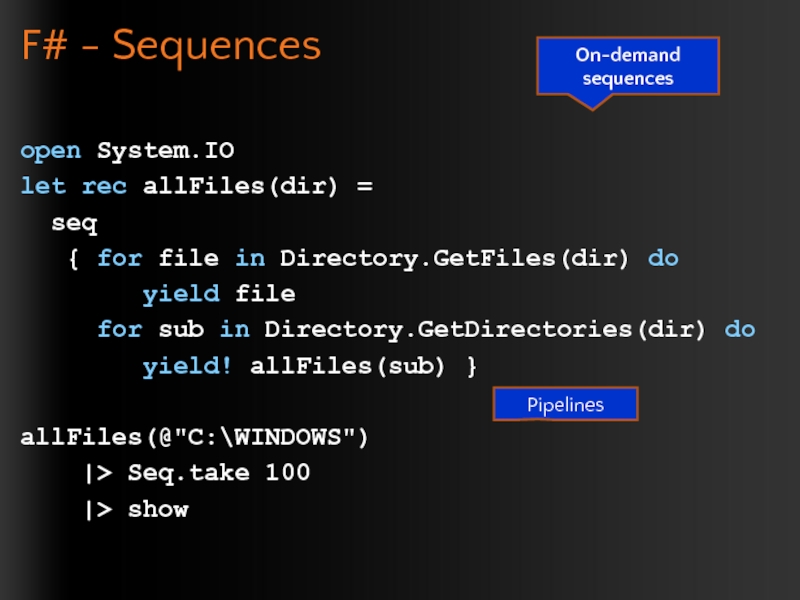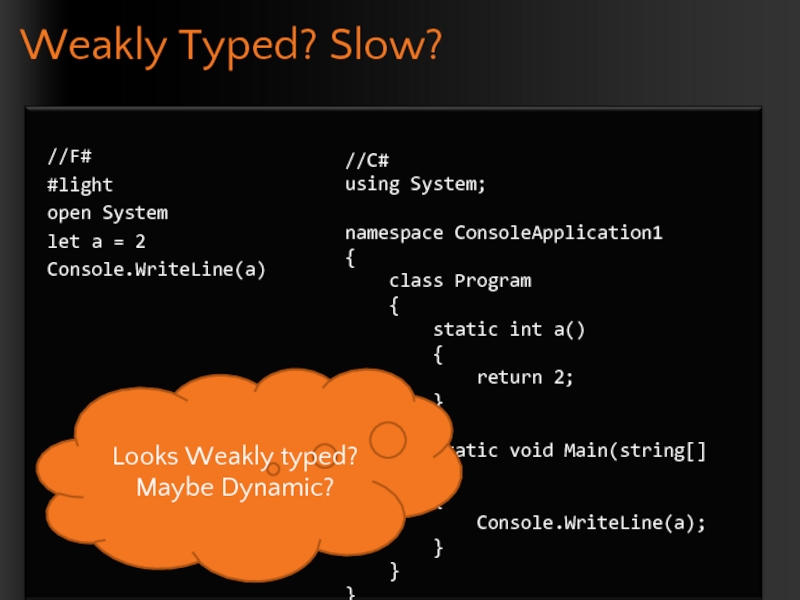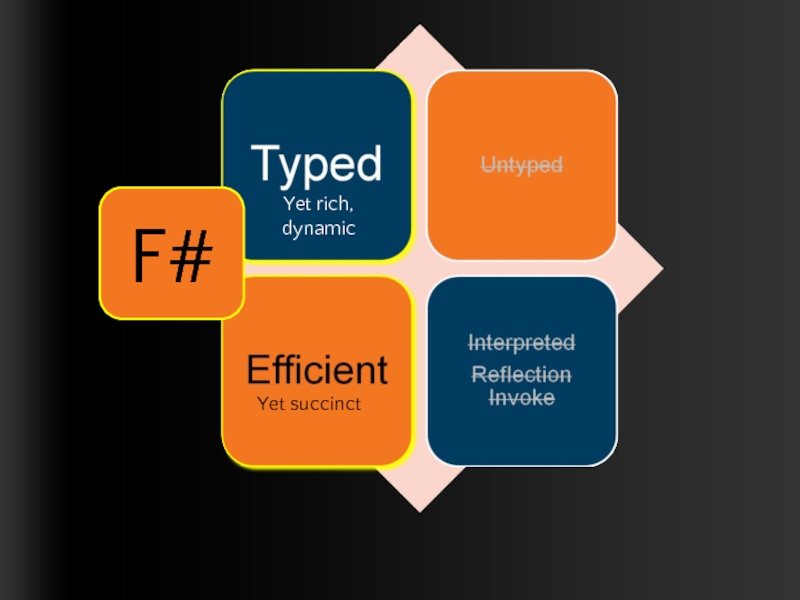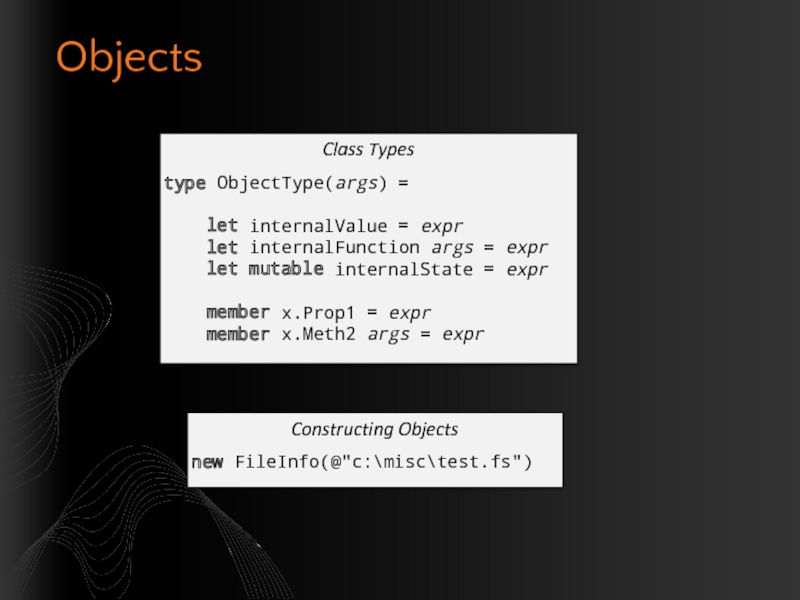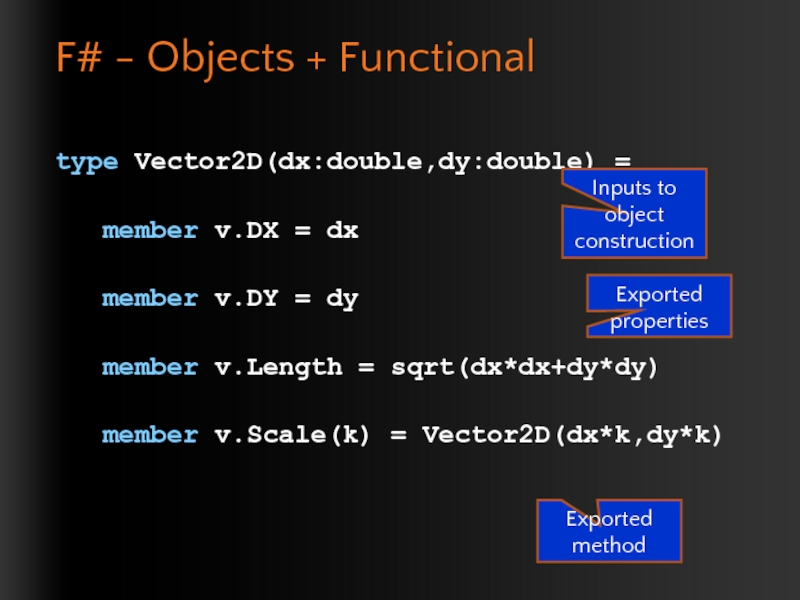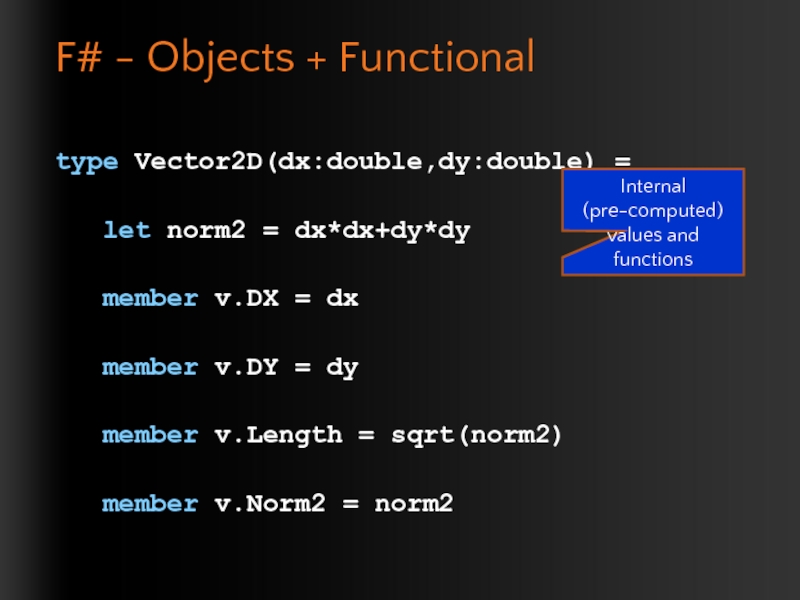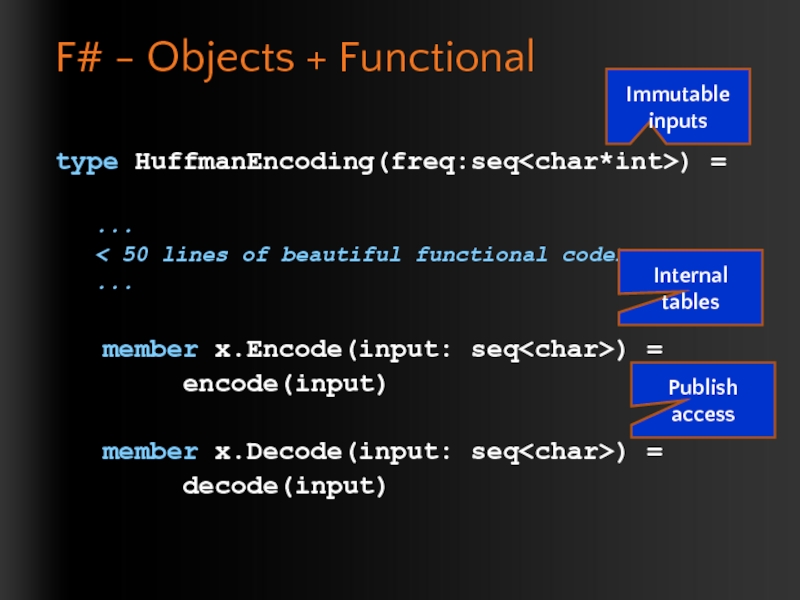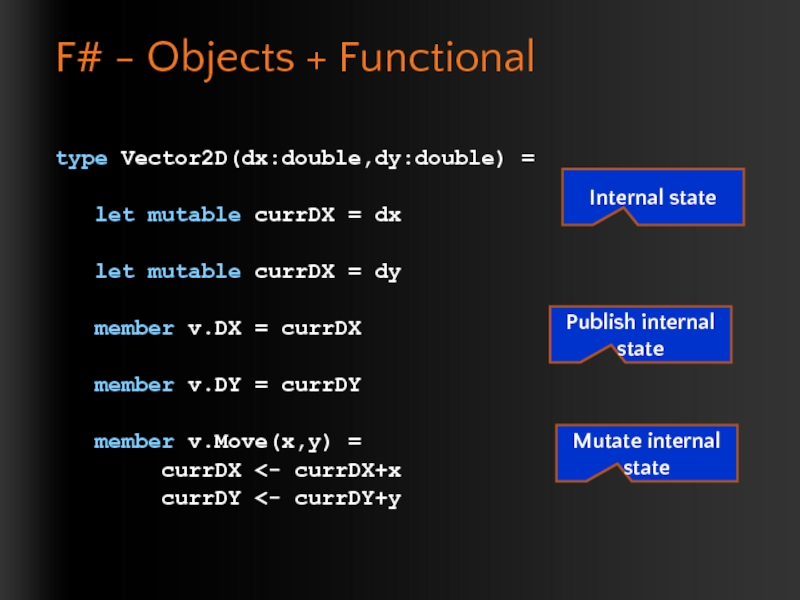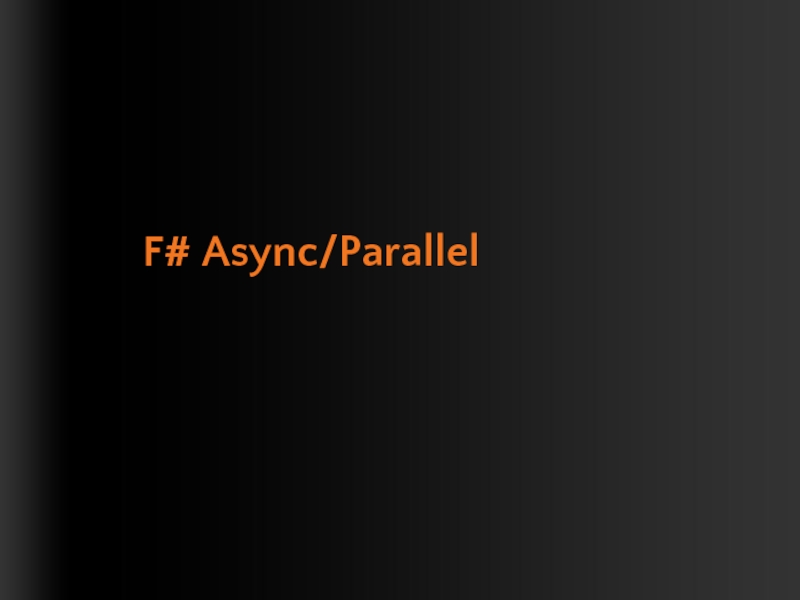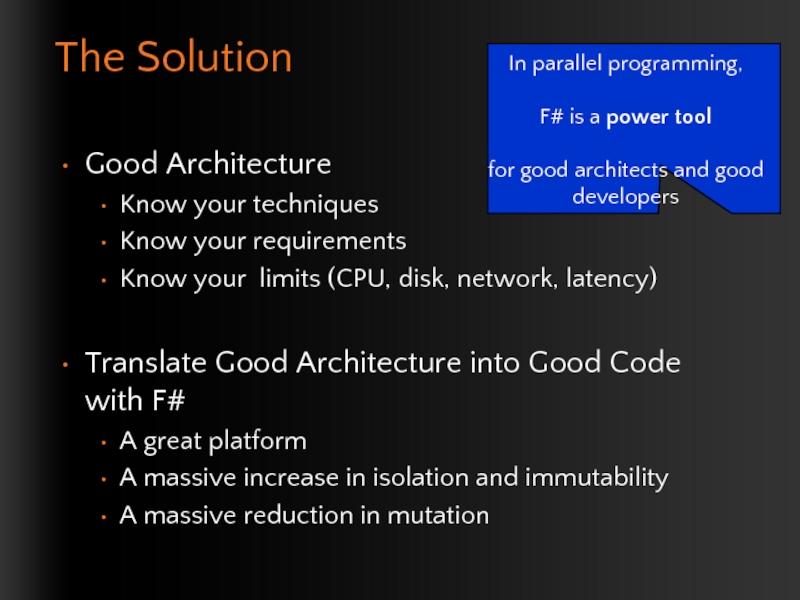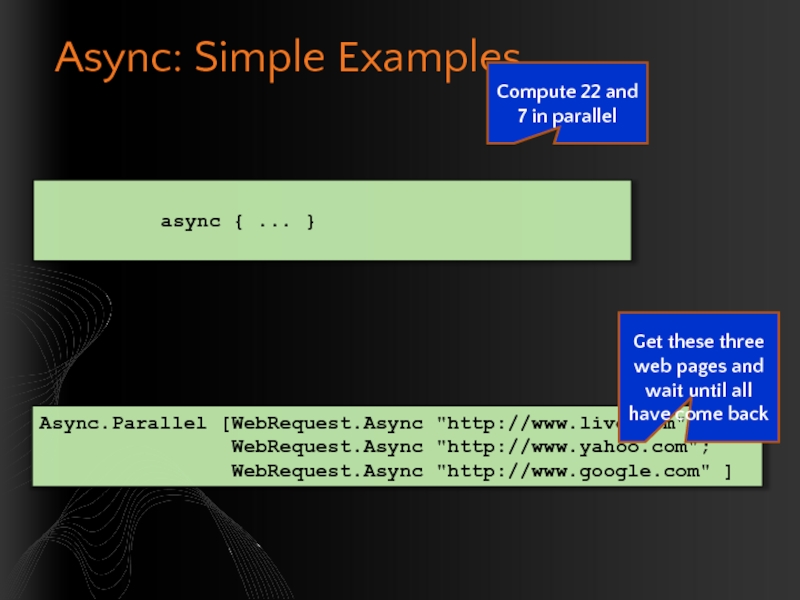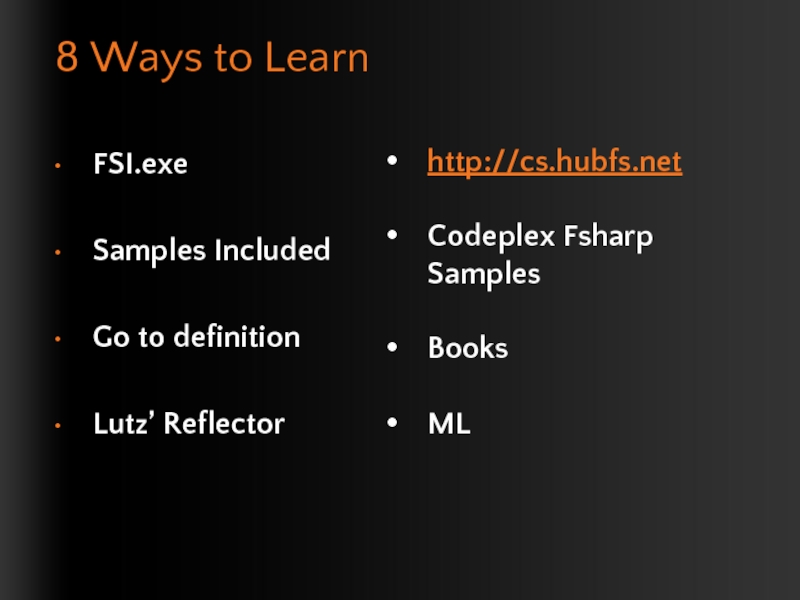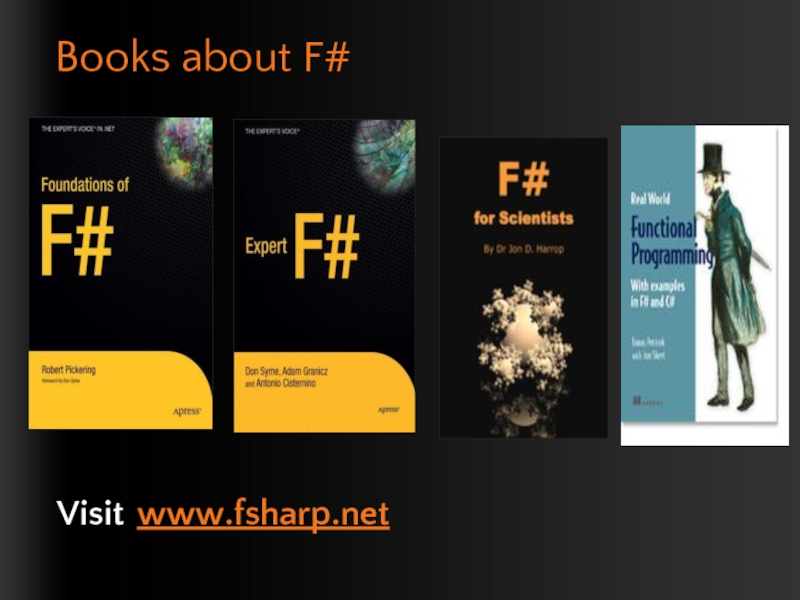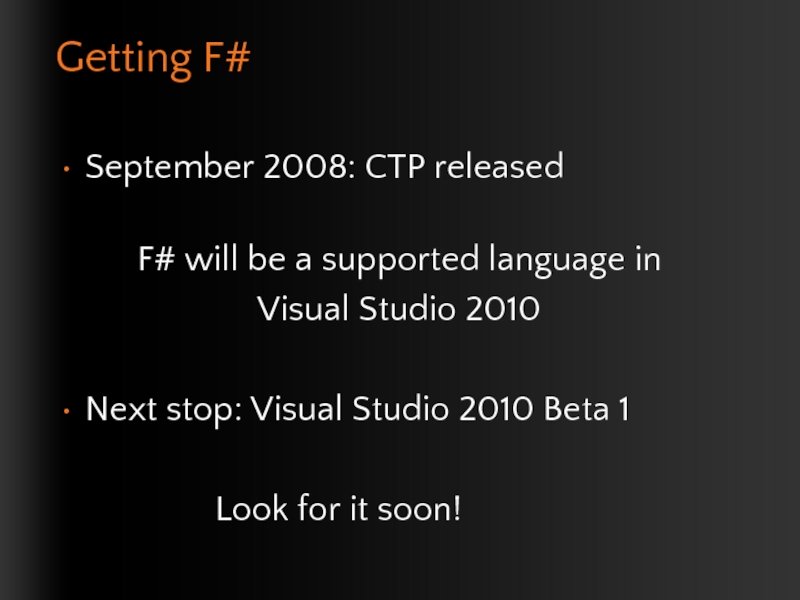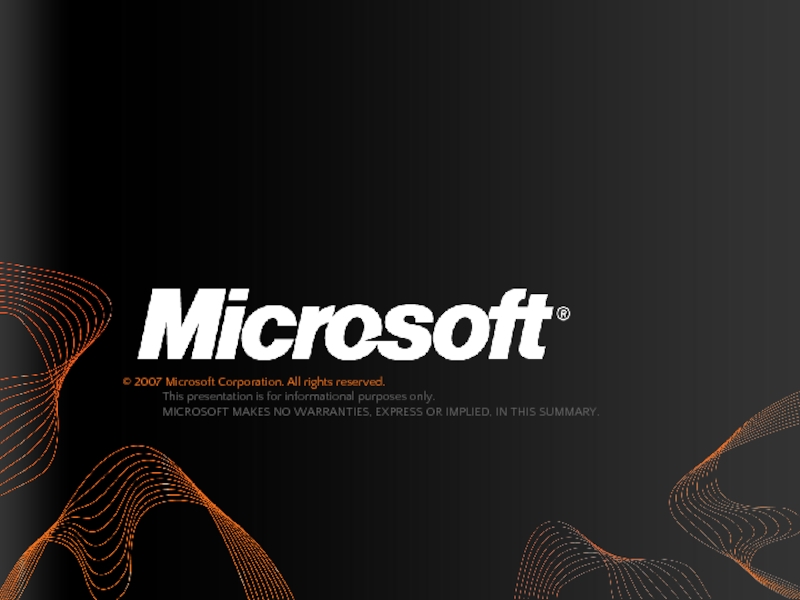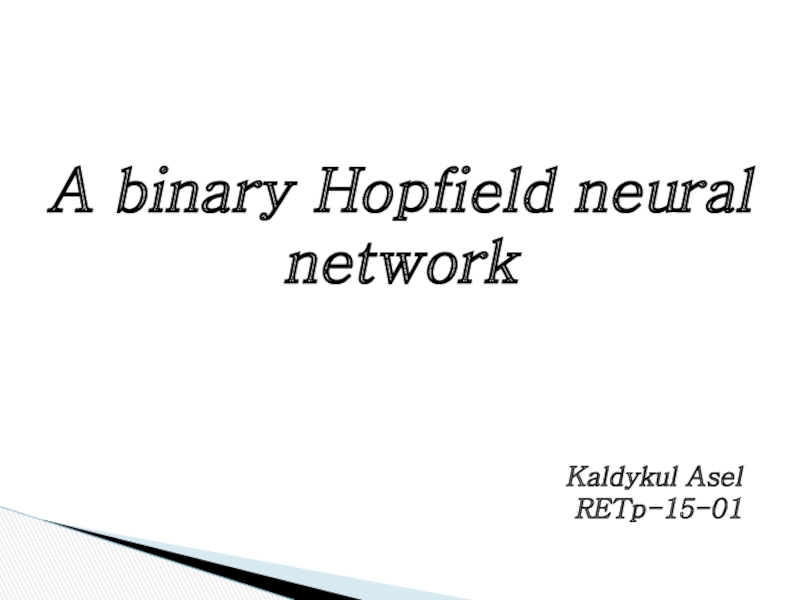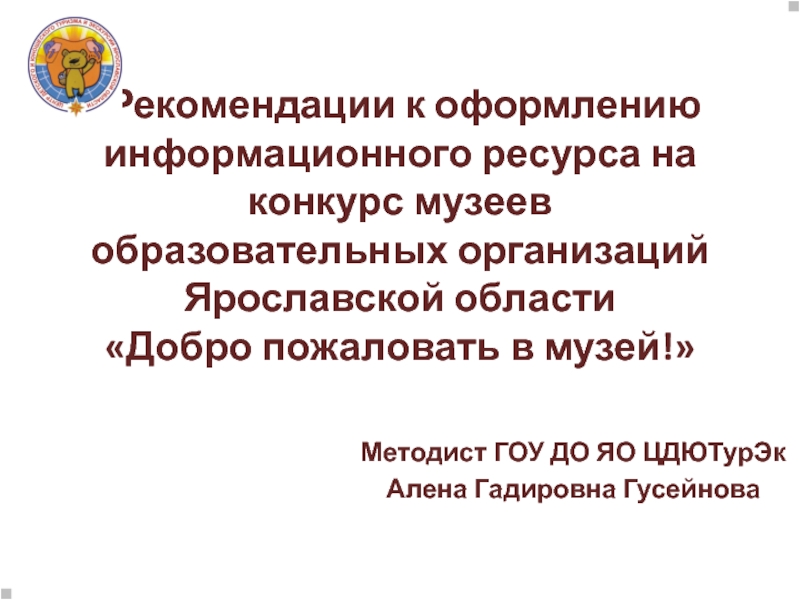- Главная
- Разное
- Дизайн
- Бизнес и предпринимательство
- Аналитика
- Образование
- Развлечения
- Красота и здоровье
- Финансы
- Государство
- Путешествия
- Спорт
- Недвижимость
- Армия
- Графика
- Культурология
- Еда и кулинария
- Лингвистика
- Английский язык
- Астрономия
- Алгебра
- Биология
- География
- Детские презентации
- Информатика
- История
- Литература
- Маркетинг
- Математика
- Медицина
- Менеджмент
- Музыка
- МХК
- Немецкий язык
- ОБЖ
- Обществознание
- Окружающий мир
- Педагогика
- Русский язык
- Технология
- Физика
- Философия
- Химия
- Шаблоны, картинки для презентаций
- Экология
- Экономика
- Юриспруденция
F# Succinct, Expressive, Functional презентация
Содержание
- 1. F# Succinct, Expressive, Functional
- 2. Topics What is F# about? Some
- 3. What is F# about? Or:
- 4. Simplicity
- 5. Economics
- 6. Programmer Productivity
- 7. Simplicity
- 8. Code! //F# open System let a =
- 9. Pleasure type Command = Command of
- 10. Pleasure type Expr = | True | And of Expr * Expr
- 11. Pleasure let rotate (x,y,z) = (z,x,y)
- 12. Economics
- 13. Programmer Productivity
- 14. People Love Programming In F#
- 15. F#: Influences Similar core language Similar object model
- 16. F#: Combining Paradigms I've been coding
- 17. F#: The Combination Counts!
- 18. The Path to Mastering F#
- 19. Quick Tour Comments // comment
- 20. Quick Tour Booleans not expr Boolean negation expr
- 21. Orthogonal & Unified Constructs Let “let”
- 22. Demo: Let’s WebCrawl…
- 23. Orthogonal & Unified Constructs Functions: like delegates
- 24. F# - Functional let f x =
- 25. F# - Functional List.map Seq.fold Array.filter
- 26. Immutability the norm… Values may
- 27. In Praise of Immutability Immutable objects can
- 28. F# - Lists open System.IO let rec
- 29. F# - Sequences open System.IO let rec
- 30. //F# #light open System let a =
- 31. F# Yet rich, dynamic Yet succinct
- 32. Objects Class Types type ObjectType(args) =
- 33. F# - Objects + Functional type Vector2D(dx:double,dy:double)
- 34. F# - Objects + Functional type Vector2D(dx:double,dy:double)
- 35. F# - Objects + Functional type HuffmanEncoding(freq:seq)
- 36. F# - Objects + Functional type Vector2D(dx:double,dy:double)
- 37. F# Async/Parallel
- 38. The Solution Good Architecture Know your techniques
- 39. Async: Simple Examples
- 40. DEMO
- 41. 8 Ways to Learn FSI.exe Samples
- 42. Books about F# Visit www.fsharp.net
- 43. Getting F# September 2008: CTP released
- 44. Questions & Discussion
- 45. © 2007 Microsoft Corporation. All rights reserved.
Слайд 8Code!
//F#
open System
let a = 2
Console.WriteLine a
//C#
using System;
namespace ConsoleApplication1
{
class Program
{
{
return 2;
}
static void Main(string[] args)
{
Console.WriteLine(a);
}
}
}
More Noise
Than Signal!
Слайд 9Pleasure
type Command = Command of (Rover -> unit)
let BreakCommand =
let TurnLeftCommand =
Command(fun rover -> rover.Rotate(-5.0
Pain
abstract class Command
{
public virtual void Execute();
}
abstract class MarsRoverCommand : Command
{
protected MarsRover Rover { get; private set; }
public MarsRoverCommand(MarsRover rover)
{
this.Rover = rover;
}
}
class BreakCommand : MarsRoverCommand
{
public BreakCommand(MarsRover rover)
: base(rover)
{
}
public override void Execute()
{
Rover.Rotate(-5.0);
}
}
class TurnLeftCommand : MarsRoverCommand
{
public TurnLeftCommand(MarsRover rover)
: base(rover)
{
}
public override void Execute()
{
Rover.Rotate(-5.0);
}
}
Слайд 10Pleasure
type Expr =
| True
| And of Expr * Expr
| Nand of Expr * Expr
| Or of Expr * Expr
| Xor of Expr * Expr
| Not of Expr
Pain
public abstract class Expr { }
public abstract class UnaryOp :Expr
{
public Expr First { get; private set; }
public UnaryOp(Expr first)
{
this.First = first;
}
}
public abstract class BinExpr : Expr
{
public Expr First { get; private set; }
public Expr Second { get; private set; }
public BinExpr(Expr first, Expr second)
{
this.First = first;
this.Second = second;
}
}
public class TrueExpr : Expr { }
public class And : BinExpr
{
public And(Expr first, Expr second) : base(first, second) { }
}
public class Nand : BinExpr
{
public Nand(Expr first, Expr second) : base(first, second) { }
}
public class Or : BinExpr
{
public Or(Expr first, Expr second) : base(first, second) { }
}
public class Xor : BinExpr
{
public Xor(Expr first, Expr second) : base(first, second) { }
}
public class Not : UnaryOp
{
public Not(Expr first) : base(first) { }
}
http://stepheneasey.wordpress.com/tag/c/
Слайд 11Pleasure
let rotate (x,y,z) = (z,x,y)
let reduce f (x,y,z) =
Pain
Tuple
{
return new Tuple
}
int Reduce(Func
{
return f(t.Item1) + f(t.Item2) + f (t.Item3);
}
Слайд 16F#: Combining Paradigms
I've been coding in F# lately, for a production
I can start with a pure idea, and still finish my project with realistic code. You're never disappointed in any phase of the project!
Julien Laugel, Chief Software Architect, www.eurostocks.com
Слайд 20Quick Tour
Booleans
not expr Boolean negation
expr && expr Boolean “and”
expr || expr Boolean “or”
Overloaded Arithmetic
x
x - y Subtraction
x * y Multiplication
x / y Division
x % y Remainder/modulus
-x Unary negation
Слайд 21Orthogonal & Unified Constructs
Let “let” simplify your life…
let data = (1,2,3)
let
let sum = a + b + c
let g(x) = sum + x*x
g(a), g(b), g(c)
Bind a static value
Bind a static function
Bind a local value
Bind a local function
Type inference. The safety of C# with the succinctness of a scripting language
Слайд 23Orthogonal & Unified Constructs
Functions: like delegates + unified and simple
(fun x
let f(x) = x + 1
(f,f)
val f : int -> int
Anonymous
Function value
Declare a
function value
A pair
of function values
predicate = 'a -> bool
send = 'a -> unit
threadStart = unit -> unit
comparer = 'a -> 'a -> int
hasher = 'a -> int
equality = 'a -> 'a -> bool
One simple
mechanism,
many
uses
A function type
Слайд 24F# - Functional
let f x = x+1
let pair x = (x,x)
let
let data = (Some [1;2;3], Some [4;5;6])
match data with
| Some(nums1), Some(nums2) -> nums1 @ nums2
| None, Some(nums) -> nums
| Some(nums), None -> nums
| None, None -> failwith "missing!"
Слайд 25F# - Functional
List.map Seq.fold
Array.filter Lazy.force Set.union
Map LazyList Events Async...
[
[ for x in 0..10 -> (x, x * x) ]
[| for x in 0..10 -> (x, x * x) |]
seq { for x in 0..10 -> (x, x * x) }
Range
Expressions
List via query
Array via query
IEnumerable
via query
Слайд 26Immutability the norm…
Values may not be changed
Data is immutable by default
✗
✓ Copy & Update
Слайд 27In Praise of Immutability
Immutable objects can be relied upon
Immutable objects can
Immutable objects can be aliased safely
Immutable objects lead to (different) optimization opportunities
Слайд 28F# - Lists
open System.IO
let rec allFiles(dir) =
[ for file in
yield file
for sub in Directory.GetDirectories(dir) do
yield! allFiles(sub) ]
allFiles(@"C:\Demo")
Generated Lists
Слайд 29F# - Sequences
open System.IO
let rec allFiles(dir) =
seq
{
yield file
for sub in Directory.GetDirectories(dir) do
yield! allFiles(sub) }
allFiles(@"C:\WINDOWS")
|> Seq.take 100
|> show
On-demand sequences
Pipelines
Слайд 30//F#
#light
open System
let a = 2
Console.WriteLine(a)
//C#
using System;
namespace ConsoleApplication1
{
class Program
static int a()
{
return 2;
}
static void Main(string[] args)
{
Console.WriteLine(a);
}
}
}
Looks Weakly typed?
Maybe Dynamic?
Weakly Typed? Slow?
Слайд 32Objects
Class Types
type ObjectType(args) =
let internalValue = expr
let mutable internalState = expr
member x.Prop1 = expr
member x.Meth2 args = expr
Constructing Objects
new FileInfo(@"c:\misc\test.fs")
Слайд 33F# - Objects + Functional
type Vector2D(dx:double,dy:double) =
member v.DX =
member v.DY = dy
member v.Length = sqrt(dx*dx+dy*dy)
member v.Scale(k) = Vector2D(dx*k,dy*k)
Inputs to object construction
Exported properties
Exported method
Слайд 34F# - Objects + Functional
type Vector2D(dx:double,dy:double) =
let norm2 =
member v.DX = dx
member v.DY = dy
member v.Length = sqrt(norm2)
member v.Norm2 = norm2
Internal (pre-computed) values and functions
Слайд 35F# - Objects + Functional
type HuffmanEncoding(freq:seq) =
...
...
member x.Encode(input: seq
encode(input)
member x.Decode(input: seq
decode(input)
Immutable inputs
Internal tables
Publish access
Слайд 36F# - Objects + Functional
type Vector2D(dx:double,dy:double) =
let mutable currDX
let mutable currDX = dy
member v.DX = currDX
member v.DY = currDY
member v.Move(x,y) =
currDX <- currDX+x
currDY <- currDY+y
Internal state
Publish internal state
Mutate internal state
Слайд 38The Solution
Good Architecture
Know your techniques
Know your requirements
Know your limits (CPU, disk,
Translate Good Architecture into Good Code with F#
A great platform
A massive increase in isolation and immutability
A massive reduction in mutation
In parallel programming,
F# is a power tool
for good architects and good developers
Слайд 39Async: Simple Examples
async { ... }
Compute 22 and 7 in parallel
Async.Parallel [WebRequest.Async "http://www.live.com";
WebRequest.Async "http://www.yahoo.com";
WebRequest.Async "http://www.google.com" ]
Get these three web pages and wait until all have come back
Слайд 418 Ways to Learn
FSI.exe
Samples Included
Go to definition
Lutz’ Reflector
http://cs.hubfs.net
Codeplex Fsharp Samples
Books
ML
Слайд 43Getting F#
September 2008: CTP released
F# will be a supported language in
Visual Studio 2010
Next stop: Visual Studio 2010 Beta 1
Look for it soon!

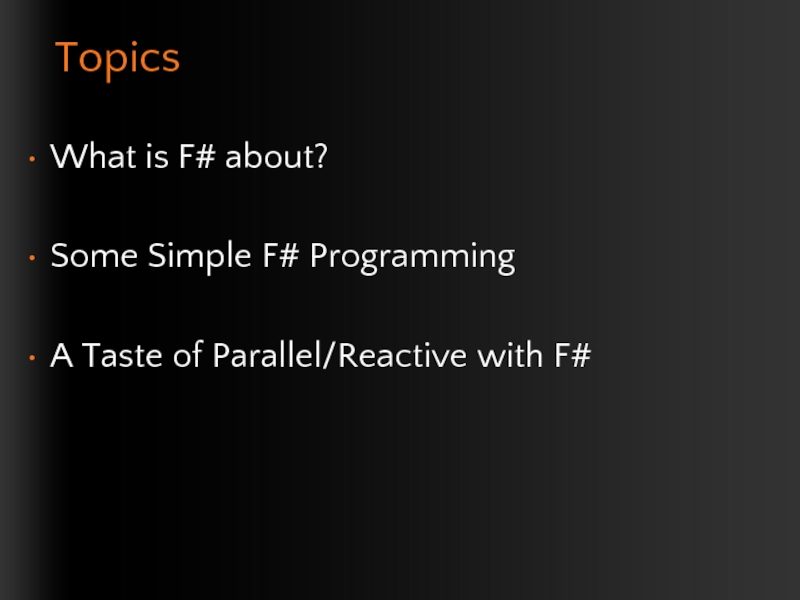
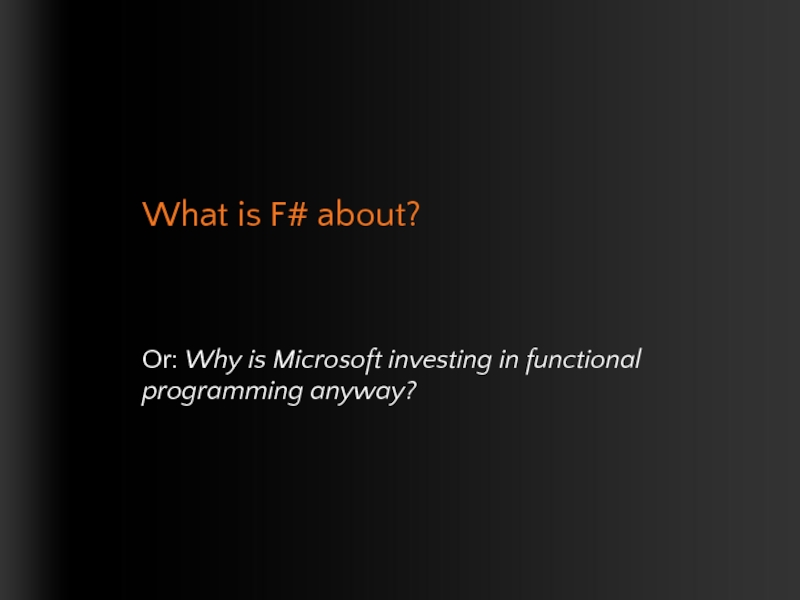
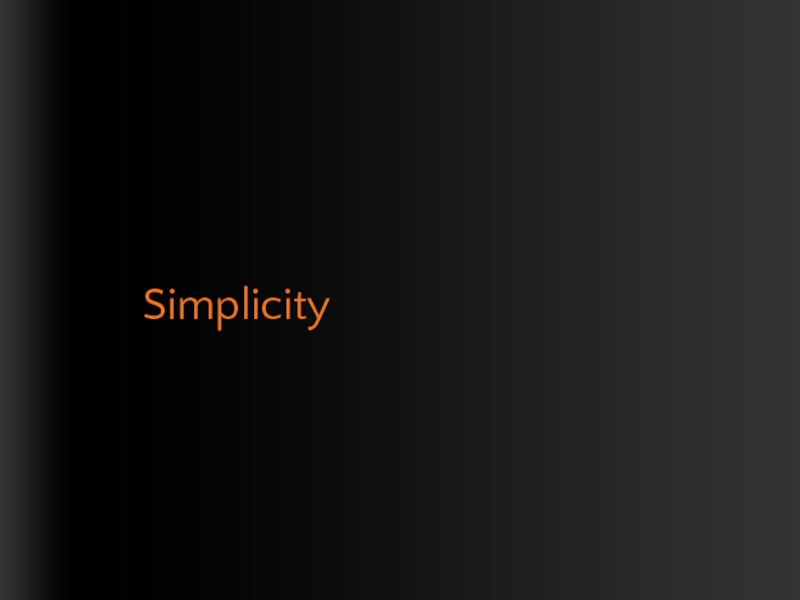

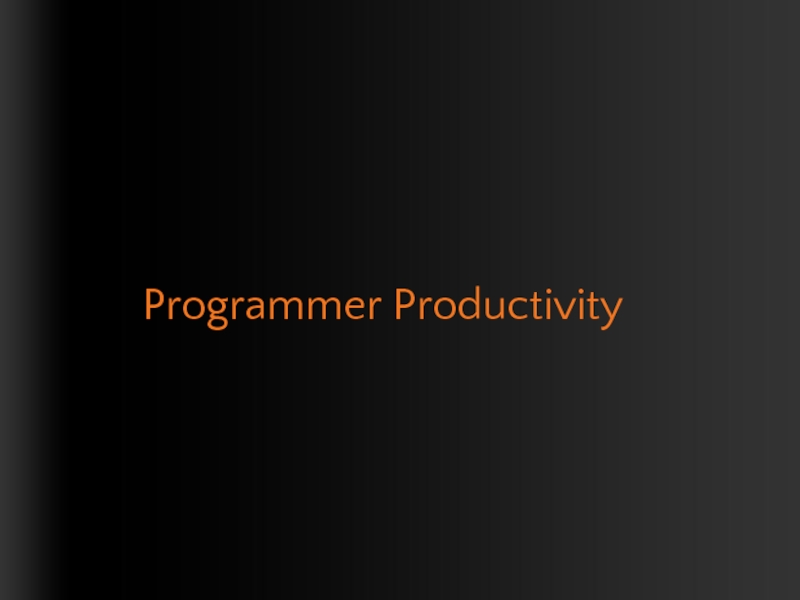
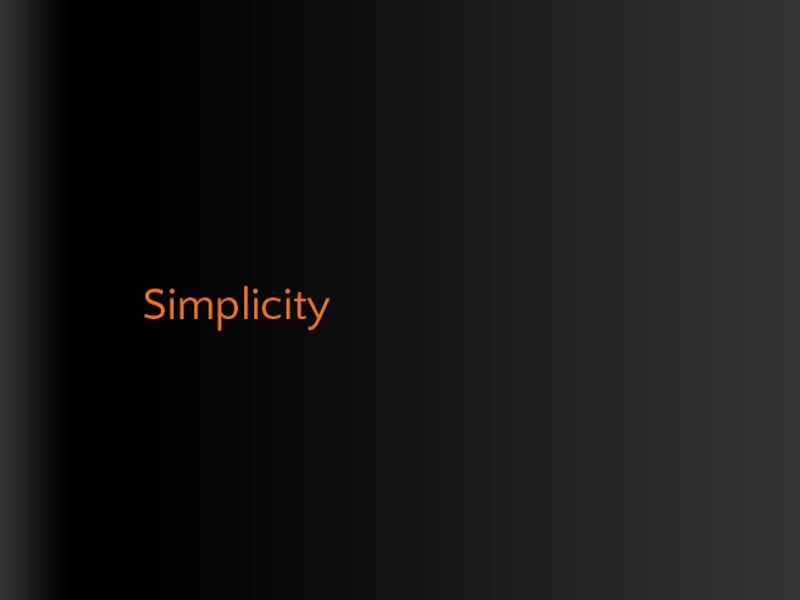
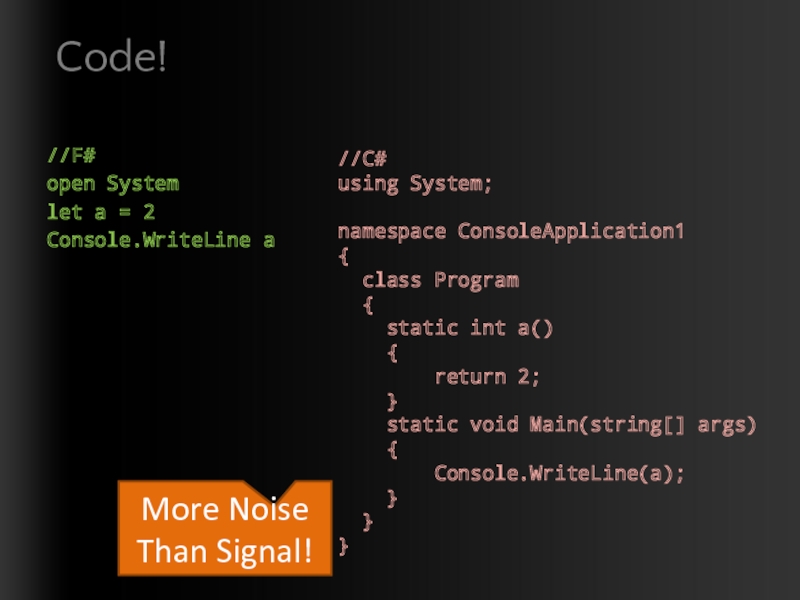
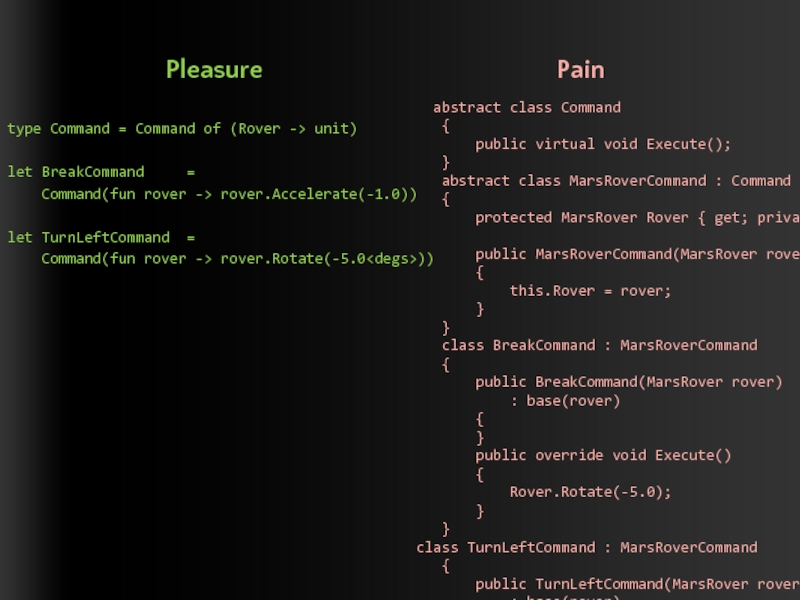
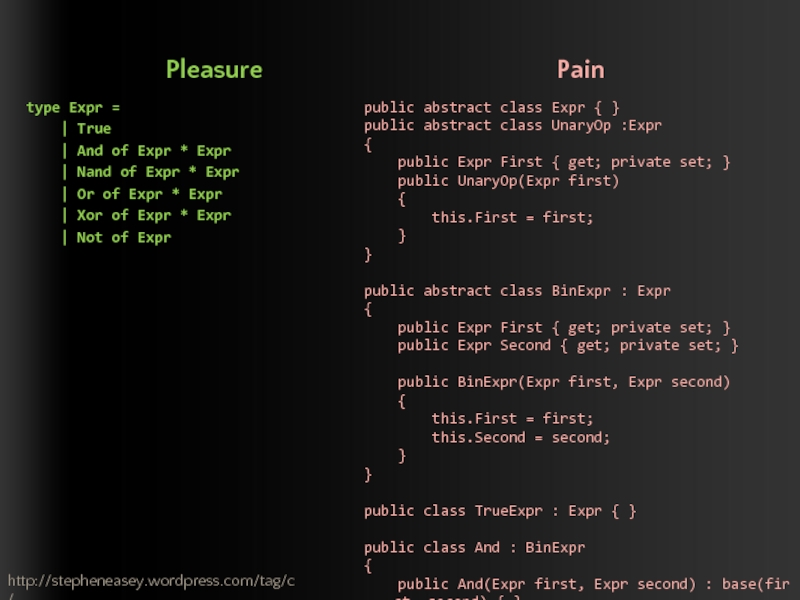
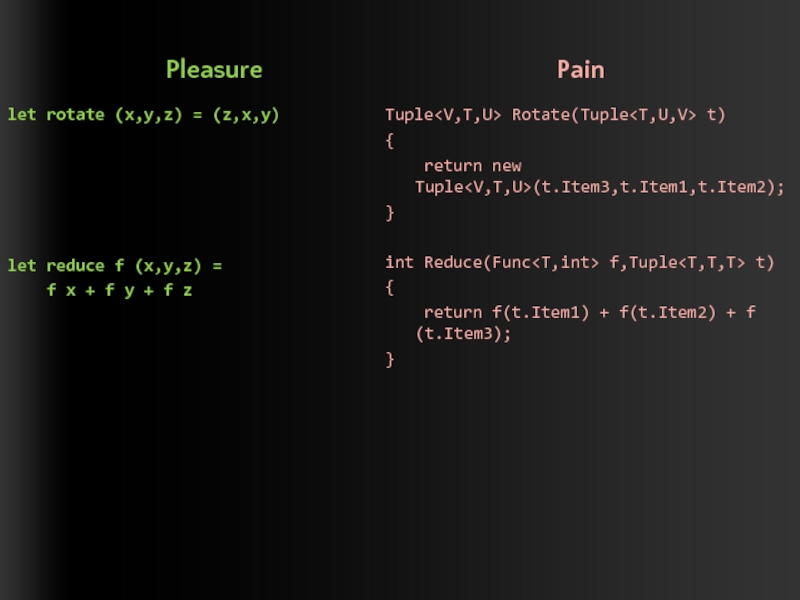

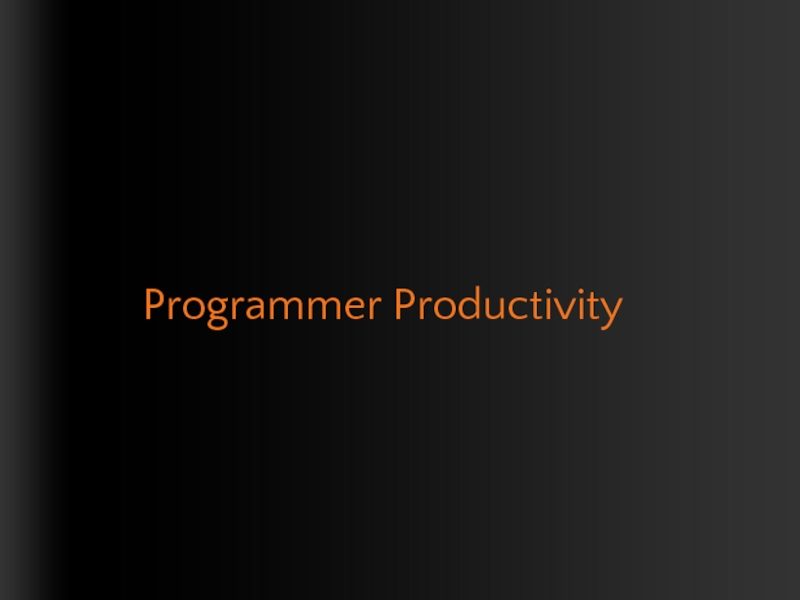
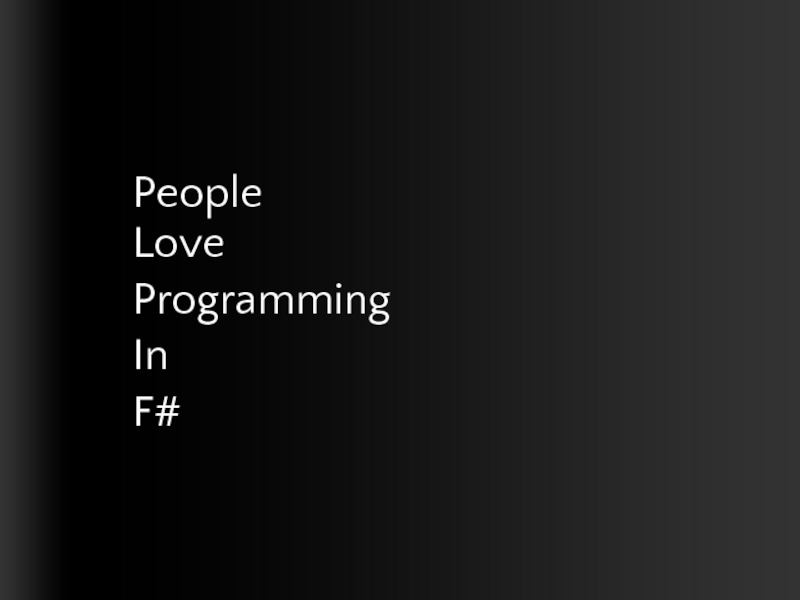
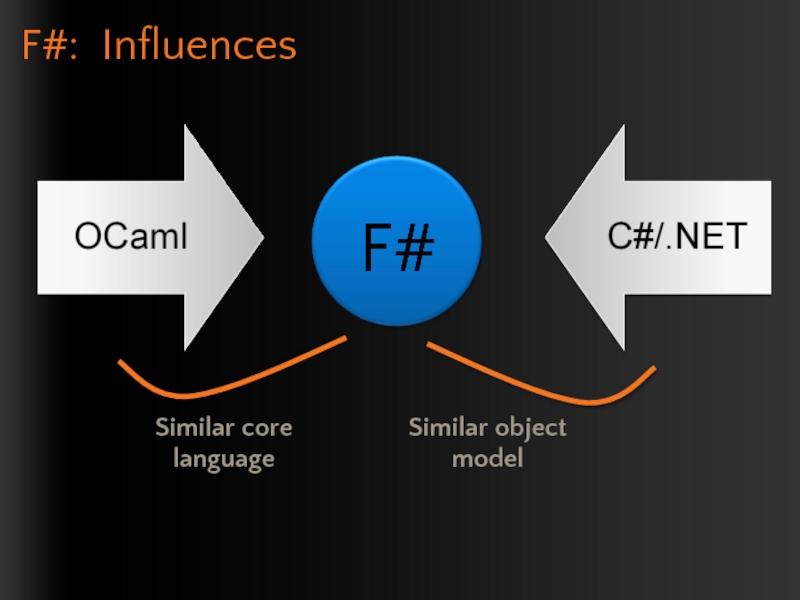
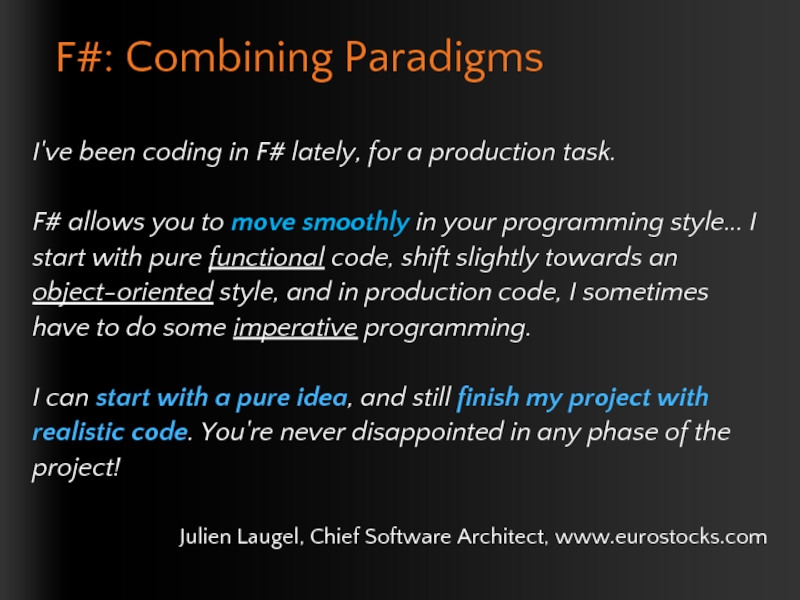
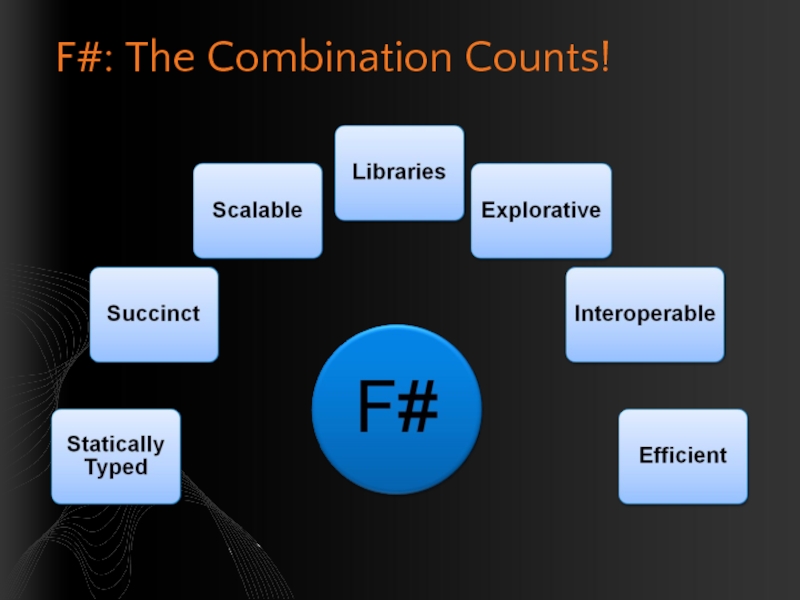
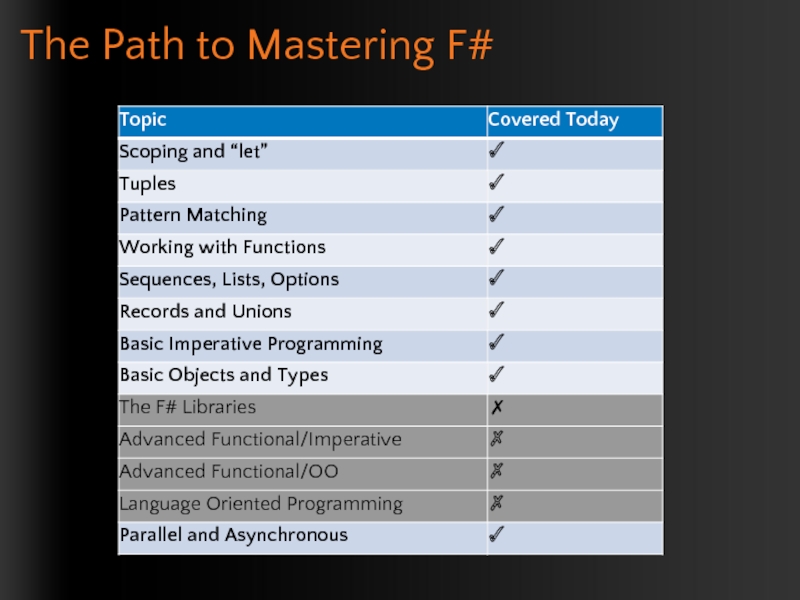
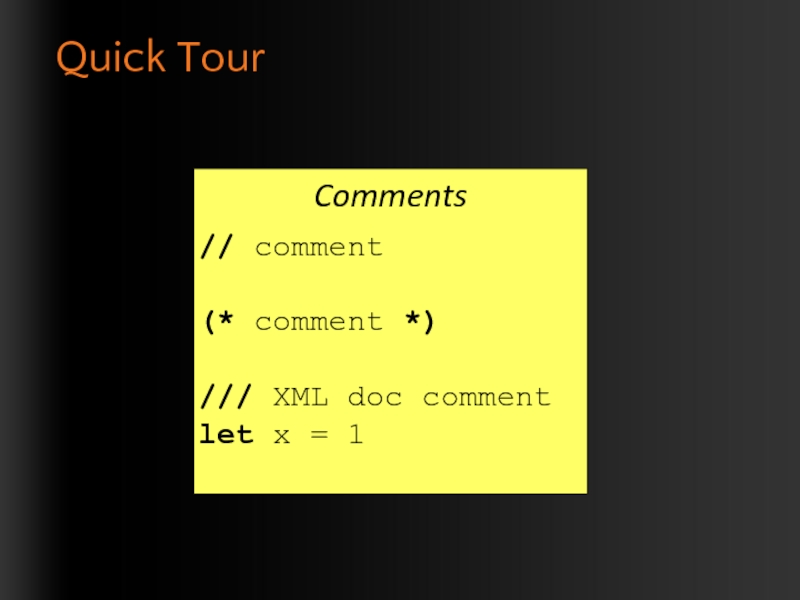
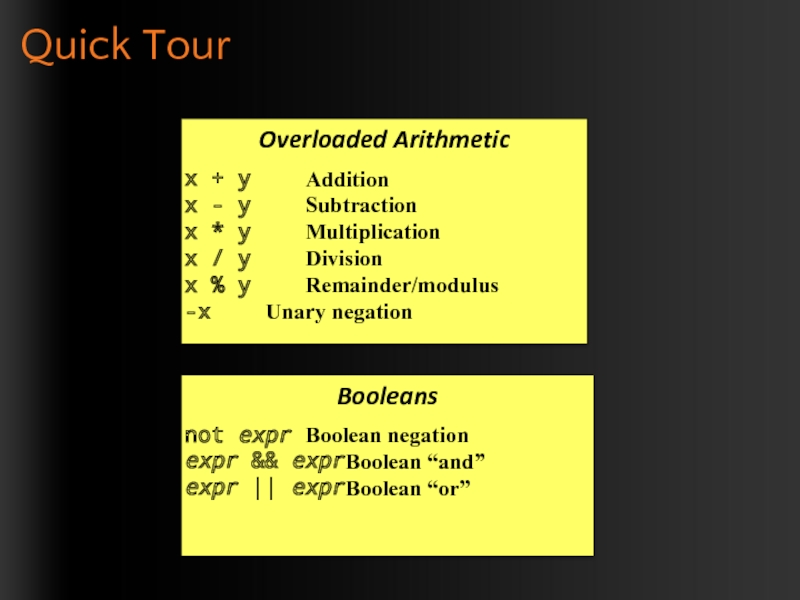
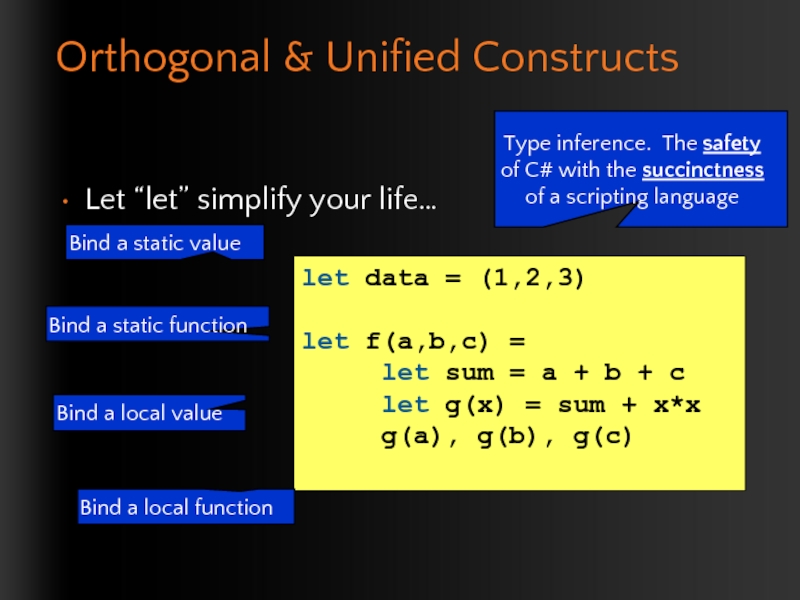

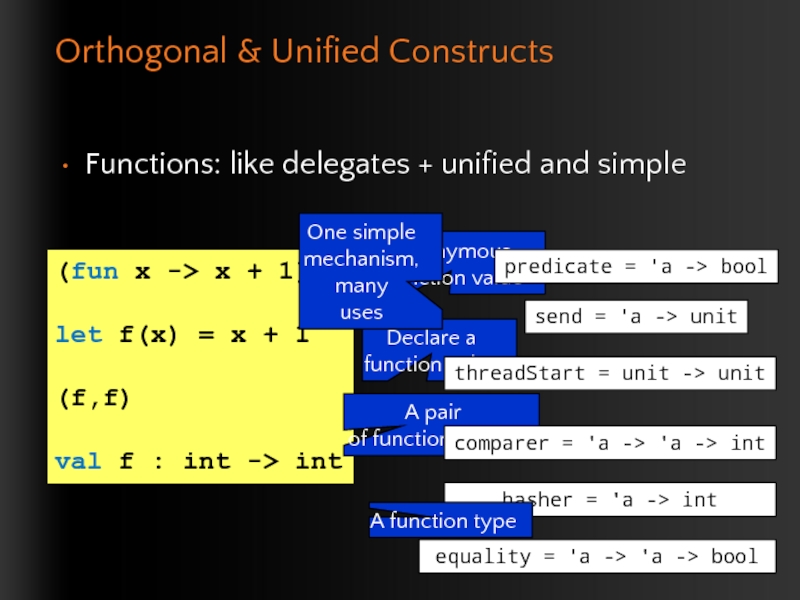
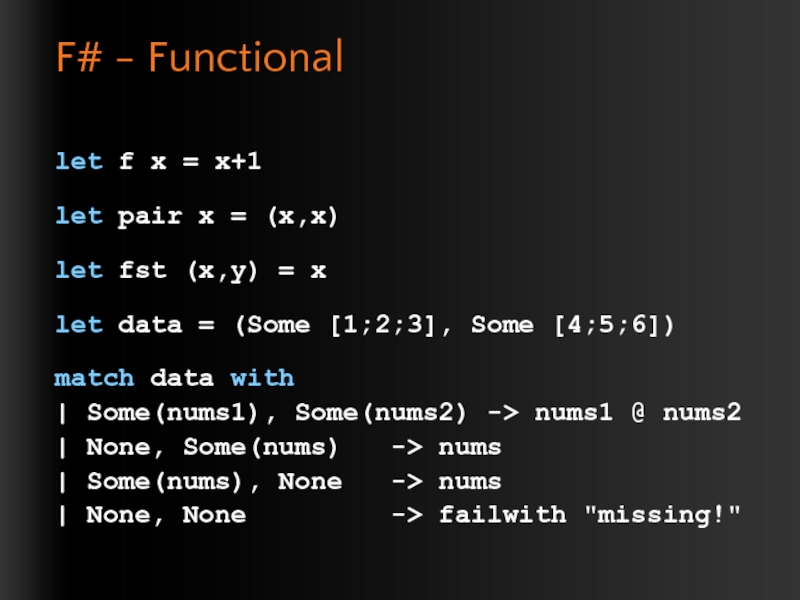
![F# - FunctionalList.map Seq.foldArray.filter Lazy.force Set.unionMap LazyList Events Async...[ 0..1000 ] [ for x in 0..10](/img/tmb/1/13443/3fb4ed40a60c4fd51e177d515b40a19f-800x.jpg)
